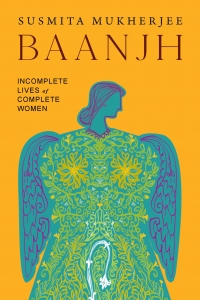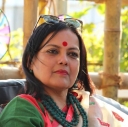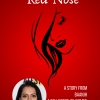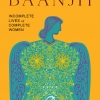
Long before I became synonymous with ‘Kitty’, there was this round-faced, pugnosed kid with a ‘Sadhana’ fringe who everyone swore resembled their residential colony’s favourite cat, Kitty. So, Kitty, she came to be known as.
When Kitty was barely three years old, her mother and aunt dressed her up in a lampshade for the annual Durga pooja show. Now the tall lamp with its pleated white shade was highly indignant at having its shade descend from its perch and protested at the indignity of being placed on Kitty’s waist, by constantly slipping downwards. Poor Kitty’s protests were totally ignored. But she had cleverly made peace with the situation by bartering it for a full ‘Cabbry’ promised by her aunt after the show. Oh yes! The show. In front was a huge audience, laughing, chatting, clapping their hands, calling out to her. The beautiful idol of Ma Durga on the raised stage opposite was shimmering with lights and little Kitty opened her mouth wide and laughed. Lifting her skirt, she twirled and twirled while the crowd enticed her with ‘come on, kid’. The lamp and Kitty sailed on the wings of that magical night, amidst claps and cheers. That is how it all began. Now, sixty years later, I look back at that little kid with deep love. Honestly, through all these years it seems I was desperately chasing something unknown, unseen, at best a feeling!
When I was doing my masters in English literature from the prestigious Miranda House, I was a self-respecting Marxist, Leftist, communist, not knowing the difference but believing that the street theatre we were doing under the tutelage of Badal Sircar would bring in the revolution and destroy the dirty capitalists. We wore kurtas on lehengas, our jholas were stocked with Capstan cigarettes and we drank a lot of tea. The revolution we were hoping for did not happen. During the Emergency of 1977, we were thus performing but ran away when the police gave us a chase. Thereafter er we returned to the safety of our parental fold. Subsequently, I joined the National School of Drama, and into a spanking new life, where I was harrowed for not knowing Hindi. I flinch when I think of how I shrugged my shoulders, American style, and walked a hippy walk while playing a village belle, Malika, in Kalidas’s Ashad ka Ek Din. After that, I hired the services of an Urdu master to teach me the national language.
I landed in Mumbai on a hot summer day of 1983 and then just about drowned in the giant monsoon deluge of that year. I survived to become yet another wannabe struggler in the arms of the great city. We had no homes, no phones, no food, no friends, only a mad passion to expand oneself in art, whatever that meant! I remember even becoming a waitress at Prithvi cafeteria because then dinner was on the house. I have done over a hundred movies in multiple languages and over fi ft y TV shows where I have played diverse characters. I purposely did not opt for being the heroine, or comedian, or vamp. I believed then as I do now, that I had parts of each in me and my journey was to shine a torch on them through the roles I was offered.
Secretly I always aspired to be a writer but was uncertain about changing gears due to financial insecurities. Besides which I was helping my multi-talented husband Raja Bundela, set up his media house. I was also mothering our two sons but in the dead of the night, I would be ghostwriting scripts and screenplays for the plethora of TV shows that our company, Prayaas Production, was engaged in. I never got acknowledged but the joy of seeing my words and thoughts come alive on screen gave me a huge high. I did get an NFDC award for my original screenplay for NATI, which I converted into a play and had a humbling success with it. It was under the aegis of my theatre group called ‘Naatak Company’ which I had formed in 1988 with two of my NSD batchmates. The company exists to date and in 2018, after a considerable hiatus, I revived it with my original solo play Naribai where I play 26 characters. The same year my maiden novel Mee & Juhibaby was published.
BAANJH—Incomplete Lives of Complete Women happened over three decades. All this while, I have been collecting a lot of my observations and thoughts in the form of story ideas. I have played multiple roles, both on and off-screen— first as a Delhi Bengali to being a Mumbaikar and finally a Bundelkhandi bahu. All the characters of BAANJH spoke to me from the depths of the people that I encountered: whiff s of conversations, waft s of stories, echoes, shadows, whispers. I’ve enjoyed meeting and observing women from all strata, highly wealthy and successful right down to menials, sex workers, migrant workers, middle-class women, village women, small-town women, the ordinary, nameless, faceless, yet each vibrating with the trembling potential of power and compassion.
It has been a blessed ride. Through the contrasting landscapes of experiences, I have learnt to see others better, to respect their otherness as we co-travel through this transition.
Theatre, films, production, NGO, writing, family—I hold all my dreams possessively around me, allowing each one the attention it needs. But every now and then, I stop and think: Where am I headed? Do I see an exquisite chocolate gleaming in its silken purple sheath? No, there is only a piercing beam of light as it cuts through the mist. I will follow that light.
About the Author





Comments